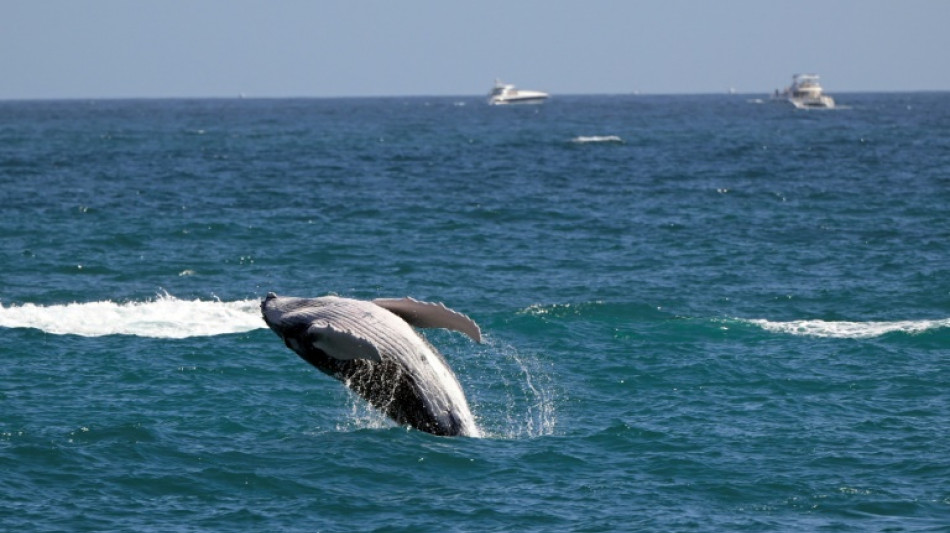
-
 Kim takes one-shot lead over Thomas, Novak at RBC Heritage
Kim takes one-shot lead over Thomas, Novak at RBC Heritage
-
Another round of anti-Trump protests hits US cities

-
 'So grateful' - Dodgers star Ohtani and wife welcome first child
'So grateful' - Dodgers star Ohtani and wife welcome first child
-
PSG maintain unbeaten Ligue 1 record, Marseille back up to second

-
 US, Iran report progress in nuclear talks, will meet again
US, Iran report progress in nuclear talks, will meet again
-
US Supreme Court intervenes to block Trump deportations

-
 Hamas armed wing says fate of US-Israeli captive unknown
Hamas armed wing says fate of US-Israeli captive unknown
-
Pacers thump Bucks to open NBA playoffs

-
 Sabalenka reaches Stuttgart semis as Ostapenko extends Swiatek mastery
Sabalenka reaches Stuttgart semis as Ostapenko extends Swiatek mastery
-
Zelensky says Ukraine will observe Putin's Easter truce but claims violations

-
 'Fuming' Watkins fires Villa in bid to prove Emery wrong
'Fuming' Watkins fires Villa in bid to prove Emery wrong
-
DR Congo boat fire toll revised down to 33

-
 England thrash Scotland to set up France Grand Slam showdown
England thrash Scotland to set up France Grand Slam showdown
-
Verstappen's Red Bull 'comes alive' to claim record pole in Jeddah

-
 McTominay fires Napoli level with Inter as Conte fuels exit rumours
McTominay fires Napoli level with Inter as Conte fuels exit rumours
-
Rajasthan unleash Suryavanshi, 14, as youngest IPL player but lose thriller

-
 Man City boost top five bid, Aston Villa thrash in-form Newcastle
Man City boost top five bid, Aston Villa thrash in-form Newcastle
-
Villa rout Newcastle to rekindle bid to reach Champions League

-
 Dumornay gives Lyon lead over Arsenal in Women's Champions League semis
Dumornay gives Lyon lead over Arsenal in Women's Champions League semis
-
Trans rights supporters rally in London, Edinburgh after landmark ruling

-
 'We have to wait': Barca's Flick on Lewandowski injury fear
'We have to wait': Barca's Flick on Lewandowski injury fear
-
Bordeaux-Begles backups edge Pau to close in on Top 14 summit

-
 Trans rights supporters rally outside in London, Edinburgh after landmark ruling
Trans rights supporters rally outside in London, Edinburgh after landmark ruling
-
PSG beat Le Havre to stay on course for unbeaten Ligue 1 season

-
 Man City close in on Champions League with Everton late show
Man City close in on Champions League with Everton late show
-
14-year-old Vaibhav Suryavanshi becomes youngest IPL player

-
 Barca make stunning comeback to beat Celta Vigo in Liga thriller
Barca make stunning comeback to beat Celta Vigo in Liga thriller
-
Zverev sets up birthday bash with Shelton in Munich

-
 Man City boost top five bid, Southampton snatch late leveller
Man City boost top five bid, Southampton snatch late leveller
-
US Supreme Court intervenes to pause Trump deportations

-
 Alcaraz and Rune race into Barcelona final
Alcaraz and Rune race into Barcelona final
-
US, Iran to hold more nuclear talks after latest round

-
 Man City close in on Champions League thanks to Everton late show
Man City close in on Champions League thanks to Everton late show
-
Bayern close in on Bundesliga title with Heidenheim thumping

-
 Tunisia opposition figures get jail terms in mass trial
Tunisia opposition figures get jail terms in mass trial
-
Putin announces 'Easter truce' in Ukraine

-
 McLaren duo in ominous show of force in Saudi final practice
McLaren duo in ominous show of force in Saudi final practice
-
Afghan PM condemns Pakistan's 'unilateral' deportations

-
 Iran says to hold more nuclear talks with US after latest round
Iran says to hold more nuclear talks with US after latest round
-
Comeback queen Liu leads US to World Team Trophy win

-
 Buttler fires Gujarat to top of IPL table in intense heat
Buttler fires Gujarat to top of IPL table in intense heat
-
Unimpressive France stay on course for Grand Slam showdown

-
 Shelton fights past Cerundolo to reach Munich ATP final
Shelton fights past Cerundolo to reach Munich ATP final
-
Vance and Francis: divergent values but shared ideas

-
 Iran, US conclude second round of high-stakes nuclear talks in Rome
Iran, US conclude second round of high-stakes nuclear talks in Rome
-
Dumornay gives Lyon first leg lead over Arsenal in women's Champions League semis

-
 Trans rights supporters rally outside UK parliament after landmark ruling
Trans rights supporters rally outside UK parliament after landmark ruling
-
Rune destroys Khachanov to reach Barcelona Open final

-
 From Messi to Trump, AI action figures are the rage
From Messi to Trump, AI action figures are the rage
-
Vance discusses migration during Vatican meeting with pope's right-hand man


Gray whales shrinking fast as climate warms
Pacific coast gray whales have shrunk in length an astonishing 13 percent since 2000, adding to evidence that climate change and other human activities are making marine mammals smaller, a study says.
Their diminished size could have big impacts on survival rates and reproductive success -- and trigger ripple effects throughout their entire food webs.
For the paper, researchers focused on the Pacific Coast Feeding Group (PCFG) -- around 200 whales that are part of the wider Eastern North Pacific (ENP) population of around 14,500.
Considered "ecosystem sentinels," they stay closer to shore, feeding in shallower, warmer waters, than the wider population that inhabits colder, deeper Arctic seas. Prior research had shown they are in worse shape than their counterparts, with smaller bodies, heads and flukes.
"Now we know they have been shrinking in body size over the past 20-40 years, which may be an early warning sign that the population is at risk of declining," Kevin Bierlich, an assistant professor at Oregon State University and co-author of the paper in Global Change Biology, told AFP on Thursday.
By analyzing drone images taken from 2016-2022 of 130 individuals whose age was estimated or known, the scientists found a striking trend: a gray whale born in 2020 is likely to reach a full-grown adult length of approximately 1.65 meters (5ft 5in) less than a counterpart born in 2000.
This represents a significant 13 percent decrease in the total length of mature gray whales, which typically measure between 38-41 feet in length.
Notably, the decline was more pronounced in females, who historically exceeded males in size but are now comparable.
It would be the equivalent of seeing the average height of an American woman plummeting from 5ft 4in to 4ft 8in over two decades.
- Size matters -
"In general, size is critical for animals," said Enrico Pirotta, lead author on the study and a researcher at the University of St. Andrews in Scotland.
"It affects their behavior, their physiology, their life history, and it has cascading effects for the animals and for the community they're a part of."
Smaller whale calves may have lower survival rates when they stop weaning, while for adults, the major concern is reproductive success.
The species relies on energy reserves stored during the feeding season to support the demands of migration and reproduction during winter -- and the question arises whether they are able to put enough energy towards reproduction and keeping the population growing.
Importantly, the study found the trend was correlated with changes to the balance of "upwelling" and "relaxation" cycles of the ocean.
Upwelling transports nutrients from deeper waters to shallower areas. During relaxation periods, these nutrients remain in the shallower zones, where light enables plankton and other small species that whales feed on to grow.
Climate change is known to be an important factor affecting the dynamics of this delicate balance, through changes in wind patterns and water temperature.
A smaller stature may not only hinder whales' ability to thrive, but also increase their vulnerability to threats such as collisions with boats and entanglement in fishing gear, which can be deadly.
S.F.Warren--AMWN



